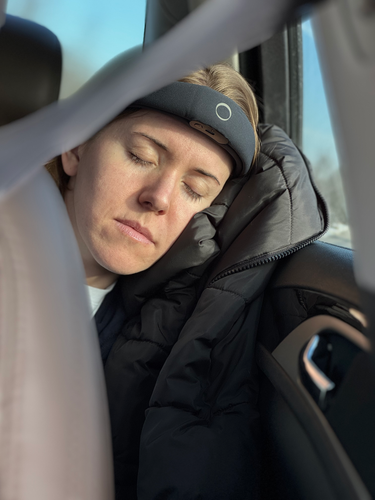By Dr. Ryan Neely, PhD
When I was a kid, I lived under the rule that 6am was the earliest I was allowed to wake anyone up on Christmas morning. That didn’t stop me from “accidentally” making noise on my way to and from sneaking peeks at the tree. As we head into the holiday season, our sleep often takes a hit whether it's caused by our own holiday excitement or that of others. Many of us travel across time zones, disrupting our internal clocks and day-to-day rhythms. Others may face stress from family gatherings or sleeping away from home. Understanding how these changes impact our sleep and what we can do about it is key to staying rested and sharp, even when the festivities ramp up.
Time zone shifts, known as “circadian misalignment,” disrupt the body’s internal clock, making it tough to get quality rest at new destinations. Research shows that crossing multiple time zones can delay sleep onset, reduce total sleep time, and decrease sleep quality (1). On top of that, heightened stress—whether due to navigating family dynamics or trying to sleep in unfamiliar beds—can increase sympathetic tone in our autonomic nervous system, impairing both how quickly we fall asleep and how efficiently we cycle through restorative sleep stages. These impacts may be heightened in certain individuals based on genetic, lifestyle, or circumstantial factors (2).
Shifts in routine and environment can increase nocturnal awakenings and reduce the amount of time you spend in deep sleep. In sleep research, this is known as the “first night effect,” in which new environments decrease sleep quantity and quantity. New research has shown that this may be due to one brain hemisphere remaining more alert, essentially acting as a sentry in an unfamiliar place (3). For example, traveling to an unfamiliar climate that changes your sleep environment, or hearing unfamiliar nighttime noises, can impact sleep continuity. Many of us also have idiosyncratic sleep routines that can be difficult to maintain during travel. Even subtle changes, such as a different mattress firmness or a variation in bedroom temperature, can affect sleep duration and efficiency.
Below are steps and strategies for better rest during the holidays. None of these rely on drastic changes; instead, they tap into small, science-backed adjustments. Then we will look at how to integrate tools like Elemind to enhance sleep onset and efficiency, no matter where you find yourself.
Gradual Time Zone Adjustment: Although it involves some up-front investment, incrementally shifting your sleep schedule by 15–30 minutes earlier or later to better align with your destination’s time zone a few days before travel can ease your adjustment period.
Strategic Light Exposure: Once you’ve arrived, get outside during local daylight hours, and dim lights in the evening. Bright light exposure can help reset your internal clock, while lower light levels signal the brain that it’s time to sleep.
Consistent Wind-Down Routine: If possible, try to take your bedtime routine on the road. If you typically read before bed, pack a book for the trip. Or, if you prefer to listen to music as you fall asleep, use the same strategy while away from home. Familiar cues can help the brain initiate sleep, even in unfamiliar places.
Environmental Control: It’s not always possible to control your sleep environment, but there are some small, packable items that mimic home comforts: a travel pillowcase, or soft earplugs. Aim for a cool, comfortable room temperature (if possible) and try to minimize ambient light. A sleep mask can be helpful in these cases.
Along with these strategies, tools like Elemind’s neurotechnology can accelerate sleep onset and improve sleep efficiency. Elemind directly targets the brain’s patterns of arousal that may be elevated in new environments By helping the brain navigate into sleep more quickly, Elemind can be one part of a strategy that supports a faster adjustment to time zone shifts and helps counter the overstimulation that often accompanies the holiday season.
Approaching holiday sleep with a balanced set of strategies—gradual schedule shifts, controlled light exposure, mindful wind-down routines, environmental tweaks, and cutting-edge tools like Elemind—can help maintain better rest and ensure you get the most out of your holiday time. Staying sharp and well-rested can also be a key factor in scoring the best holiday cookies before they’re all gone.
References:
1. Reilly, T., Waterhouse, J. and Edwards, B., 2009. Some chronobiological and physiological problems associated with long-distance journeys. Travel Medicine and Infectious Disease, 7(2), pp.88-101.
2. Kalmbach, D.A., Anderson, J.R. and Drake, C.L., 2018. The impact of stress on sleep: pathogenic sleep reactivity as a vulnerability to insomnia and circadian disorders. Journal of sleep research, 27(6), p.e12710.
3. Tamaki, M., Bang, J.W., Watanabe, T. and Sasaki, Y., 2016. Night watch in one brain hemisphere during sleep associated with the first-night effect in humans. Current biology, 26(9), pp.1190-1194.


